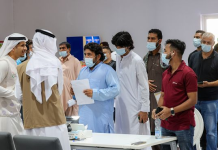Experts tell Healthline what they think of magic mushrooms, cold water therapy, and other topics discussed on Gwyneth Paltrow’s new show on Netflix.
The vagina-scented candles were only a tease.
“The Goop Lab,” which premiered on Netflix this past weekend, is a show where viewers learn the ins and outs of vulvas and much more thanks to Gwyneth Paltrow and the staff of Goopians that work on the actress’ Goop website.
Paltrow stands within a pink vulva in ads for the series, a nod to the events of episode three of the six-part series.
In that episode, one woman studies her vulva on camera with a mirror. There are also detailed instructions from a sex educator on how to achieve good orgasms.
The vulvas, though, are only one part of Paltrow’s new show.
There is also serious exploration of other outlier topics, such as psychedelic drugs used in the context of treatment and energy-erupting chiropractic sessions in addition to cold water therapy that fights illness.
“It can be very dangerous when you take things like healthcare and lifestyle management and dress it up as being legitimate when it’s meant for entertainment,” says Dr. Gary L. LeRoy, FAAFP, a family physician in Dayton, Ohio, and president of the American Academy of Family Physicians.
He recommends a discussion with a physician about methods of treatment seen on television or the internet.
“There’s just so much noise out there that people have to be careful of what they’re hearing,” he told Healthline. “We’re talking about people’s lives and their health. People can die from delaying legitimate evidence-based healthcare while they’re playing around in the goop and slime out there.”
Indeed, before you consider partaking in magic mushrooms or jumping into frigid water, listen to what experts in specific fields told Healthline about some methods seen on “The Goop Lab.”

Every episode begins the same way.
There’s a disclaimer that “The Goop Lab” is designed to entertain and inform and that you should always consult with a doctor when it comes to your own health or before you start any of these treatments.
In episode one, a handful of Goop staffers, some who want to work through their painful pasts, embark on a trip to Jamaica to take psilocybin, known as magic mushrooms, under the professional supervision of a facilitator.
One participant describes the emotionally exhausting session “like 5 years of therapy in about 5 hours.”
Since they’re illegal in the United States, psychedelics like psilocybin aren’t administered in traditional therapeutic settings.
However, they’ve been explored in the research capacity with encouraging results, one expert told Healthline.
“We’ve conducted most of the research in the United States on this,” said Matthew W. Johnson, PhD, associate professor at Johns Hopkins University in Maryland, an expert on psychedelics, other drugs, and addiction. “The data are very promising.”
Johnson, who hasn’t seen “The Goop Lab,” reports high success rates with psilocybin in treating tobacco addiction, anxiety, and depression.
“We saw large, very dramatic reductions that were immediate in both anxiety and depression [for cancer patients],” Johnson said. “Those are the most advanced therapeutic findings in the field.”
However, there are potential dangers, he says, sometimes occurring in “underground guiding” that happens in the United States.
“People with psychotic disorders or a predisposition for psychotic disorders, like schizophrenia, could be harmed,” he said. “In an unstructured setting, it can even exacerbate depression, anxiety.”
People can have “a bad trip” and engage in dangerous behavior that can lead to death. There are also cases of people who’ve died because of a cardiac response to psilocybin.
“People die,” Johnson said. “I have a file folder full of cases where people have essentially done something while they’re intoxicated — like fallen from a height or wandered into a stranger’s house and get shot by police. Wander into traffic. These are highly intoxicating drugs at high doses and people can have panic reactions, so those are the major risks.”
Traveling to Jamaica for the purpose of taking magic mushrooms isn’t advised.
“I would tell them not to do it,” Johnson said.
He also notes federal law forbids travel overseas for the purpose of engaging in criminal acts.
Then, there’s the people overseeing the programs.
“I can’t say anything about the credentialing,” he added. “You really need professional expertise to screen for these sessions and to run them. To mitigate those risks.”
Johnson said it’s important not to view psychedelics as the end all, be all.
“This isn’t the only thing out there, especially talking to people with depression or PTSD or addiction,” Johnson said. “I’d encourage them to stay in treatment and not to view [psychedelics] as the only hope for them. That’s kind of setting up people for a real let down because it may not work for them.”
But for some, psychedelics can be life-changing.
“I’ve dedicated 15 years to it for a reason,” Johnson said. “Sometimes the effects are absolutely dramatic. Some people say it’s like years of therapy packed into a day. Sometimes it seems like that. That’s hard to quantify scientifically, but they are large effects. Sometimes you get dramatic reductions in depression and addictive behavior. So, yeah, it’s indeed a really exciting area.”




